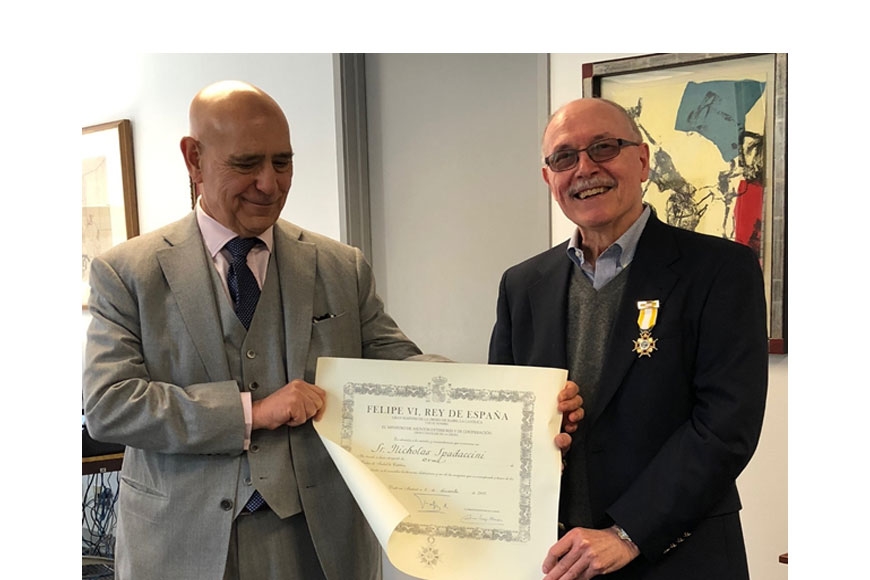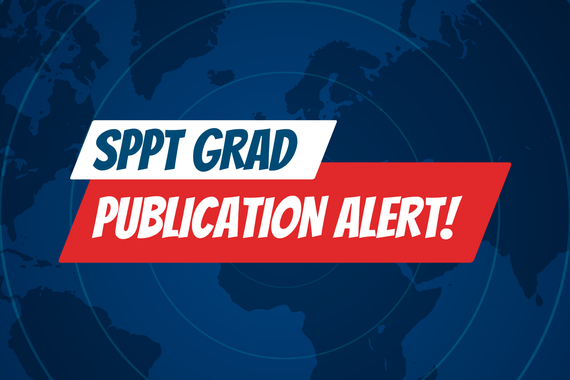Prof. Spadaccini receives the Order of the Cross of Isabella the Catholic
On April 26, 2018, Prof. Nicholas Spadaccini was awarded the Cruz de la Orden de Isabel la Católica (Order of the Cross of Isabella the Catholic) on behalf of King Philip VI of Spain. The ceremony for the award took place in Chicago and was hosted by the Consul General of Spain, Don Federico Palomera Güez.
Prof. Spadaccini joined the faculty at the University of Minnesota in September 1971, following completion of his doctoral studies at New York University, where he specialized in Spanish Golden Age literature and culture (Sixteenth and Seventeenth centuries, also commonly referred to as the Renaissance and Baroque periods, respectively), with minors in Italian and French and a general orientation toward Comparative Literature. The cultivation of his interest in Spanish and Spanish American literatures and cultures began at the Universidad de Chile and at the Universidad Católica (both in Santiago) as an undergraduate and grew during his M.A. studies at Madrid’s Universidad Complutense, in a program sponsored by New York University.
Spadaccini’s published work spans nearly half a century and encompasses a variety of subjects dealing largely, though not exclusively, with the literatures and cultures of early modern Spain and colonial Latin America, as well as with broader topics connected to the politics of editing and, more recently, to the fate of Liberal Education in general, and the Humanities in particular, at a time marked by increased fundamentalisms, by a degradation of dialog and civic discourse, by the proliferation of social media and echo chambers, and by the ugly head of nationalism and xenophobia. In the course of his academic career, a good deal of his scholarly work has been collaborative and involved projects with colleagues from the United States and abroad. Spadaccini remarks: “I have profited immensely from such collaborations, which were done in a spirit of openness and dialog, and with the conviction that the sharing and questioning of ideas would expand my horizons, lead to unexpected discoveries, and establish a bond based on friendship and common purpose.”
A Vision for Transatlantic Studies
“In line with a famous observation by Borges, in reading Cervantes one experiences the presence of a human body and in dealing with his writing is to engage in a living dialogue with ‘something’ or ‘someone’ who can speak our own language, and who can be our contemporary” (Spadaccini and Talens, Through the Shattering Glass xvi).
Spadaccini’s work has gravitated toward social and political approaches to literature and culture as reflected in his participation in the editorial work of Ideologies and Literature and later, with a broader cultural studies orientation, in the series Hispanic Issues and Hispanic Issues Online. Among the many topics that he has explored through his research over the years, he has been especially interested in Cervantes’ dialog with the mass-oriented, propagandistic theater of the Spain of his time as well as his experimental novelistic writing, one that shows a high degree of self-reflexivity and a constant testing of classical concepts of poetic discourse through a narrative practice that resists adherence to rules.
For Spadaccini, it is difficult to speak about early modern Spain without referencing Colonial Latin America and vice versa: “I was fortunate to have had colleagues who shared those convictions and were interested in collaborative work.” He is referring here especially to the late René Jara, former professor at the University of Minnesota, whom he describes as “an extraordinary reader.” Together they edited two volumes 1492-1992: Re/discovering Colonial Writing; and, Amerindian Images and the Legacy of Columbus, with substantive introductions of about one hundred pages each that were to become classics for scholars in the field. That collaboration and the research that it implied, encouraged him to prepare courses and seminars on Colonial Latin America and eventually to direct dissertations on topics that bridged the latter with Spain’s early modern period.
Expanding Discussions on Latin American and Iberian Studies
When asked about his role as the founding editor and editor-in-chief of Hispanic Issues and Hispanic Issues Online, Spadaccini states that the book series were conceived with the idea of expanding discussions regarding literature and other discourses, examining institutional issues, and providing a space for the sharing of collaborative research, often of an interdisciplinary nature, within our various areas of specialization. This can be seen in the broad range of topics on which the series have published, often bridging the Latin American and Peninsular areas, in the variety of theoretical/critical approaches, and in the diversity of issues discussed, including more recent ones dealing visual cultures, with inflationary media in early modern times as well as our own, with immigration and human rights, with the state of the Humanities and Liberal Education, and so on. Unlike other publications in the field, which tend to focus more narrowly on specific areas of interest, Hispanic Issues and Hispanic Issues Online (an open access series) are inclusive and welcome collaborative, edited volumes and “Debates” on conventional and unconventional topics; on both traditional and emergent research areas and subjects. The success of the series (which will soon reach 75 published volumes) stems from this openness and dedication to providing a space for new research initiatives.
A Collaborative Space
Most of his former students, today academics in various universities, have consistently praised the model that Spadaccini represents in all aspects of academic scholarship, and they point, particularly, to his work in building of a community of scholars through collaborative efforts. In his own words:
“I believe that collaboration and sharing is at the heart of teaching and research in that it contributes toward the breaking down of certainties and reminds us that we are not gods, but human beings, with talents and flaws. It reminds us that learning is a journey and not an end, and that certainty and pontification might be impediments to learning. Collaborative work also functions as a sort of checks and balances; as a way to get steady and even immediate feedback. Moreover, it often allows us to explore new areas of research and to also consider the wisdom of others.”



